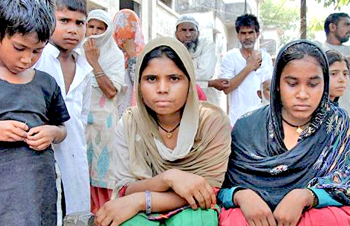 Muzaffarnagar, Jun 21: Married for the compensation, these women were rejected when the state did not pay
Muzaffarnagar, Jun 21: Married for the compensation, these women were rejected when the state did not pay
A lie floated by a junior Minister in the Akhilesh Yadav government in Uttar Pradesh has created serious trouble for many women among the riot-affected Muslim families in Muzaffarnagar. They have been thrown out by their husbands, who have accused them of hiding compensation money that they never got.
After the riots last September, a few couples from the adjoining riot-hit district of Shamli got compensation of Rs. 1 lakh each from the State government at the time of their marriage.
This triggered off a spate of marriages in the camps. Hundreds of families, hoping to get the compensation, got their daughters married in mass ceremonies.
In Muzaffarnagar too, a few families living in the Shahpur camp got this money, along with an additional compensation of up to Rs. 10,000 given by Jamiat-Ulama-i-Hind. But not far from Shahpur, those of the Jola camp got no such compensation.
In two mass-marriage ceremonies here in October 2013, 150 women, many of them underage girls, were married off.
“My in-laws asked me for the compensation money but I told them that my family got nothing,” says Sahira, who got married on October 4.
Her family fled from Lisaad village, where 13 people were killed in the communal violence. But the trouble for Ms. Sahira and other women began on April 5, when Chief Minister Akhilesh Yadav held a rally in Budhana tehsil. He was accompanied by the constituency’s election in-charge, Ayub Ansari, who has been accorded Minister of State rank.
Mr. Ansari said the State government had provided compensation money to couples who got married in the camps, including Shahpur and Jola.
Hit by police
“Some of us were there and stood up to confront his lie. But the policemen hit us with the canes,” says Afsar, a Jola camp inmate. Immediately, the husbands of women who got married in Jola turned aggressive.
“My husband beat me up and said my parents had lied to him and that they have gobbled up the entire money,” says Ms. Sahira. She was asked by her husband to leave and is now back at the camp. Another woman, Khushnuma, got married on October 18 to a man called Talib from Jeemana Majara village. “When my husband came to know about the speech, he beat me up. I bore it silently, but it didn’t stop,” she says. A few weeks later, she was dropped off at the camp by her mother-in-law.
Sent back, harassed
At least 12 women from the Jola camp alone have been sent back by their husbands. Many others said they were being harassed by their in-laws over the compensation money.
“For compensation details speak to the district magistrate,” said Ayub Ansari. “For discussion on social issues, you can speak to me.”





Comments
Add new comment